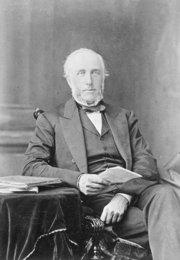George Brown (Canadian politician)
|
|
George Brown (November 29, 1818-May 9, 1880) was a Scottish-born Canadian journalist and politician. The founder and editor of the Toronto Globe, he was a noted Reform politician and supporter of Canadian Confederation.
Brown was born in Alloa, Clackmannan, Scotland, on November 29, and immigrated to Canada in 1843. He founded the Globe in 1844.
In 1848, he was named secretary of a commission of inquiry to investigate alleged abuses in the provincial penitentiary at Kingston. Brown worked zealously at the task. The Brown Report, which Brown drafted early in 1849, produced copious evidence of brutality and maladministration, and the existing warden, Henry Smith, was soon removed from office.
He supported political reform in Canada, especially "representation by population," and was elected to the Legislative Assembly of the Province of Canada in 1851.
He reorganized the Clear Grit (Liberal) Party in 1857, supporting, among other things, the separation of church and state and the annexation of the Northwest Territories. He became one of the chief developers of the concept of Confederation among the provinces. In 1864, he led the Great Coalition with John A. Macdonald and George-Étienne Cartier, and later that year played a major role at the Charlottetown and Quebec Conferences. He resigned from the Coalition in 1865.
In 1867, Brown ran for seats in both the Canadian House of Commons and, as leader of the provincial Liberals for a seat in the Ontario legislature hopefully as Premier but failed to win election to either chamber. He was widely seen as the leader of the federal Liberals in the 1867 federal election. The Liberals were officially leaderless until 1873, but Brown was considered the party's "elder statesman" even without a seat in the House of Commons, and was regularly consulted by leading Liberal parliamentarians.
Brown was made a Senator in Ottawa in 1873.
Brown became a leading opponent of Macdonald's Conservative Party and a leader of the opposition Liberals. He lost much popularity, however, by tyrannically trying to crush a printers' strike in Toronto. He had the strikers jailed and fired. In response to these actions by his rival, Macdonald passed laws permitting trade unionism for the first time in Canada.
In 1880, one of his former employees of the Globe, George Bennett, who was disgruntled by Brown's actions, shot Brown in the leg on the front steps of his Beverley Street home in Toronto; what seemed to be a minor injury turned gangrenous, and he died from the wound.
Toronto's George Brown College is named for him.
External links
- Biography at the Dictionary of Canadian Biography Online (http://www.biographi.ca/EN/ShowBio.asp?BioId=38983)
|
Preceded by: | Upper Canada/Ontario Liberal leaders |
Succeeded by: |
|
Preceded by: | Liberal Leaders |
Succeeded by: |

